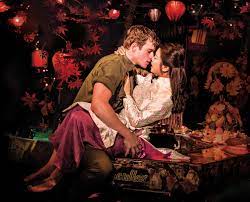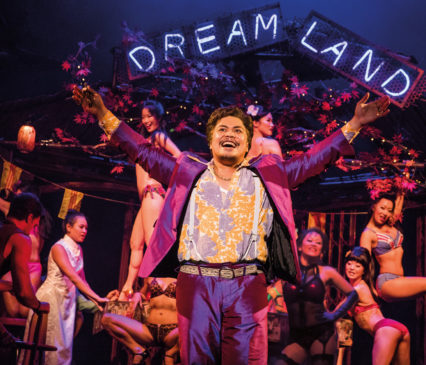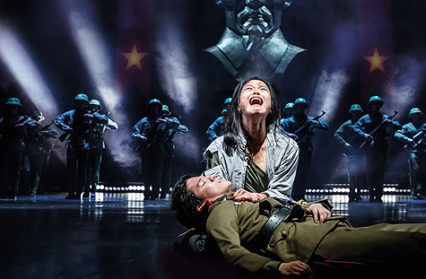Emily Garside is at the Wales Millennium Centre to cast a critical eye over a production of the classic Broadway musical Miss Saigon which depicts the Vietnam War.
There is a reason that the ‘Mega Musicals’ of the 80s and 90s have endured: they are (for the most part) a masterclass in musical production. However, Miss Saigon, famously, is not without its problems. In its original run it was plagued by scandal when caucasian actor Jonathan Pryce was cast in the Asian role of the engineer. Problems also exist with the story itself; its representation of women, for example – all wives and whores. And this is, of course, another Western telling of the Vietnam War, and although not unilaterally praising of America’s actions, Miss Saigon is a simplistic vision. This is a selective, sanitised and in every sense romanticised version of Vietnam.

The romance of the story is often what wins over; it is a compelling, engaging and, yes, romantic tale. However, scratching beneath the surface, if the musical was written today, we would demand better for the women and would question our place to tell stories of Vietnam in this way. But questions must be asked of this 25th anniversary revival given the current socio-political climate.
The opening segment of Miss Saigon sees the engineer wrangling his girls, forcing them to perform and sleep with the GI’s. Framed as the ‘charming rogue’ we’re supposed to be endeared to him – and indeed he has much in his past to feel sorry for – but he also is a pimp, and when he slaps Gigi for misbehaving, there is an echo of life and art. The engineer cannot remain the ‘loveable rogue’ of the piece. Here is a man using women for his own gain, for material and personal freedom, who treats women as objects. The moment where he slaps Gigi for disobeying him and laughs it off as ‘It’s Gigi; she likes it rough’ felt chillingly on point. Luckily here Red Concepcion has a handle on the darker elements of the engineer and we get a sense of the life that led him to this point.
Although it is necessary to turn a critical eye to the themes in the musical, that doesn’t distract from what is an enduring world-class piece of theatre. Miss Saigon is slightly over-long, and would benefit from losing a couple of numbers, but that’s equally a flaw with the source material it emulates. In practice Boubil and Schonberg’s score is the real star. They crafted an enduring collection of music that does what great musicals do: a balance of rousing choral numbers (“Morning of the Dragon”, “Miss Saigon”) and haunting and emotive solo numbers (“American Dream”, “Movie in my Mind”). The standouts still remain the romantic, sentimental but ultimately irresistible “Last Night of the World” and the force of nature that is “Bui Doi”. The latter, sung acapella by the male chorus and led by Ryan O’Gorman, demonstrates the musical writing talent that underpins it.

In terms of performance, this tour also demonstrates the we’ve reached a point where touring productions match, if not excel their West End counterparts. The three leads, Ashley Gilmour (Chris) Sooha Kim (Kim) and Red Concepcion (The Engineer) drive the piece with power-house vocals. Kim and Gilmour’s relationship is endearing and moving, and Gilmour in particular gives a real sense of the torture that Chris lives with post-Vietnam. Meanwhile, Concepcion gives us an engineer who is funny, flirty and entertaining but with enough of a darkness to hint at the struggles behind his public persona.
It is, however, the ‘supporting’ roles that really stand out. Gerald Santos as Thuy, an often over-looked part, really rips at the heart and makes his part human where in lesser hands Thuy can seem little more than a plot-point. Another often thankless role in Miss Saigon is Chris’ wife Ellen, played here by Zoe Doano becomes a much more human, endearing character (helped somewhat by the addition of a new song, ‘Maybe’, for the 25th Anniversary production). The stand-out star of this production however is Ryan O’Gorman as John. “Bui Doi” is a gift of a number to any musical theatre actor, but O’Gorman’s vocals were built for this song.
It’s clear from previous tours such as Mary Poppins last Christmas, that Cameron Mackintosh values the touring productions as much as the West End or Broadway ones, and has done away with the days of rickety sets and third-rate versions of the big musicals. It feels like a recognition that both audiences and performers outside London deserve quality. And the staging and production values of this tour prove that.
To find out about upcoming events at the Wales Millennium Centre visit their website.
Emily Garside is a regular contributor to Wales Arts Review.












